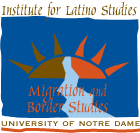
Migration is a global economic process, not a new problem, according to anthropologist Karen Richman, director of the year-old Center for Migration and Border Studies at Notre Dames Institute for Latino Studies (ILS) and fellow of the Kellogg Institute.
Migrants, a source of cheap labor, always will gravitate to areas where the cost of living is higher. It was true of Irish and Polish immigrants in the 19th century, just as its true of Mexican, Haitian and Salvadoran immigrants today.
Mexico is not always going to be a migrant-sending country,Richman said.Another will take its place. Its a process that transcends national policies.
The challenge, she says, is to help people understand that, rather than making immigrants scapegoats.
U.S. workers, Richman points out, have not done well since the 1970s. Since the North American Free Trade Agreement (NAFTA) came into effect in 1994, she said, many jobs have left the U.S., while American workers have stayed in place.
Combine that with migrants on the corner, and you get anti-immigrant sentiment,she said.
But immigration has already fundamentally altered the face of America, Richman said.The children of immigrants are Americans,she noted.Theyre here to stay.
As a cultural anthropologist, Richmans expertise is in explaining the human experience of migration. Her 2005 book,Migration and Vodou,told the story of how and why Haitian peasants, descendents of the only successful slave revolution in the New World, were transformed into U.S. migrant workers. Her research detailed the ways the migrants maintained religious traditions and family connections to loved ones in Haiti through the use of technology such as cassette tapes. Nowadays, she says, video and cell phones help families stay in touch.
Richmans current research project focuses on a woman named Elena, a member of a Mexican trans-national migrant family.
In 1984, she crawled through rat-infested water pipes and ran through fields being shot at, and chased by dogs, to come to the United States,Richman said.
A legal resident since 1986, Elena raised her family cleaning housesits how the two met.She cleaned my house,Richman says.
Richman was drawn to Elena by her wit.
Shes a tremendously eloquent woman,she said, adding that she attended theUniversity of Life.
What Ive been doing over the past year and a half is interviewing her and writing her story.
Elena has strong views on the subject of immigration reform. Richman says, quoting her:We clean their floors, and take care of their children so they can do other jobs. Why are they picking on us?
Elena came to the U.S. as an undocumented immigrant. Today she is a successful American citizen. The third annual Notre Dame Forum on Oct. 8 will examine the question: 12 million undocumented workers reside in the U.S. Should the government ignore them, help them, or deport them …or offer a pathway to citizenship?
Richmans views are clear.Offer a path to citizenship,she said.The government policies are a failure. There need to be sensible policies, based on a rational understanding of how migration fits into our economy, and our society.
Current policies, Richman argued, have the perverse effect of forcing migrants to stay in the U.S. longer than they intended, and forcing them to bring their families along, because of the difficulties of going back and forth to visit.
There needs to be an honest appraisal of who wants this undocumented labor,Richman said.The demand is still there. The government knows how many immigrant workers businesses need. Why arent they coordinating that with the number of legal visas available?
What Richman has concluded, after 20 years of research into immigration, is that people want to move freely across borders to work and live, and provide for their families.
Do you have to have only one home, one language?she said.Many want to live two places, so they and their families can live decent lives.
_ Editors Note: This story originally was published in ND Works and is one in a series of personal stories of immigration in support of the Notre Dame Forum._
p.
TopicID: 24587